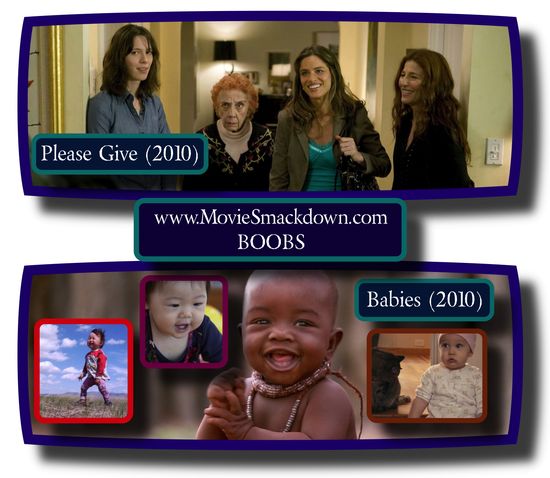 The Smackdown
The Smackdown
I love the name Julia. It’s a beautiful name, inspiring artists and poets; Robert Herrick’s sublime “Upon Julia’s Clothes†might be my favorite example. A passel of perfectly lovely movies feature Julia (or variations thereon) in their titles: Juliet of the Spirits, Jules and Jim, Julia Misbehaves to name but three. Let’s consider a few others, one a recent wide release and the other something of a high-toned seventies classic. “Julie and Julia†doubleteam “Julia.†May the best Julia win.
[singlepic id=150 w=320 h=240 float=right]
The Challenger
Nora Ephron cooks up more than Beef Bourguignon in this deceptively slight comic biography; there’s more food for thought than I ever expected. I knew that the magnificent Streep would deliver another masterful tour de force, and that she certainly did. Her performance percolates and bubbles, her laugh wells up like water from a spring, an indomitable and slightly ungainly life force inviting us in to share her electrified air. Her Julia Child is vocally impeccable, but her eloquently wordless moments tell us more than any others. A moment shared with Tucci after her sister’s letter arrives stands alone, saying everything about the Childs’ childlessness with no dialogue needed. Streep inhabits this giant among women (and men), her quick mind and undauntable spirit burning brilliant with deeply felt life. Streep’s performance lights up the screen and nestles somewhere in the chair beside you, making you realize how much you love food and Julia Child and being alive. There simply aren’t enough glowing adjectives in my usually adequate vocabulary to praise this national treasure. She and Stanley Tucci portray an unusually loving marriage that inspires and amuses, capturing something true and real, a human connection well beyond biopic’s usual parameters. And the food is beautiful; it’s food porn, not quite “Big Night†caliber but up there with the rest of the genre. And, yes, the Julie sections of the film are nowhere near so compelling as the Julia story for reasons so obvious as to be almost unworthy of listing, but list them I shall for they’ll serve my greater purpose later on in this little rant.
[singlepic id=1144 w=320 h=240 float=right]
The Defending Champion
Based on Pentimento, Lillian Hellmann’s book of memoirs (not blogs), “Julia†covers a period in the uber-turbulent 1930’s, when she attained fame with the production of her first Broadway play, The Childrens’ Hour. Meanwhile, a world away across the pond, Nazis and Fascists had their way with sitting-duck Europe. As Lillian’s longtime friend Julia studies in Vienna and becomes embroiled in the fight against Fascism, Lillian makes her mark on NY theater and forges an intriguingly egalitarian relationship with writer Dashiel Hammett. When Lillian travels to Russia for a conference, Julia asks her a dangerous favor Lillian dares not refuse. Putting her very life on the line for a friend, Lillian risks everything in the name of friendship and a larger cause.
The Scorecard
The critical matter at hand: a fatally flawed Julia Child biopic that could’ve been a contender. We’re talking world class stuff with a big but. An entrée with impeccable ingredients and all the finest intentions, a fallen soufflé, an ill-conceived menu. These half-baked metaphors make me dizzy. Everyone has weighed in with the obvious: Meryl Streep mops the floor with her characterization of Ms. Child, leaving poor dithering Amy Adams’ Julie Powell beaten, utterly outmatched. But might there be something more interesting than a simple unfair fight afoot here? Mother Superior Streep took on Lightweight Novitiate Adams before in “Doubt†and no one suggested excising Ms. Adams’ role from the film. This is no personal vendetta; Amy Adams is possessed of considerable charms, but this enterprise fails in ways that lead us to an intriguing discussion of achievement and aggrandizement, adulthood and self awareness.
Adults, it seems, aren’t what they used to be. The Greatest Generation fought and won World War Two, and now we are left with their whining grandchildren and great grandchildren, the Not-So-Great generation. The smallest setback unleashes their barely secreted inner child ready to tantrum and filing a non-stop list of grievances and complaints. No stiff upper lips, no grinning and bearing it for this bunch. Oh no. Nobody sucks up anything. Even the smallest current of disappointment registers as devastating on their emotionally retarded, reset Richter scale.
Julie follows her drippy husband to the outer boroughs at the beginning of the film; her neighborhood is regrettably isolated and unattractive, decidedly unglamorous. Okay, it’s not Paris. But it’s hardly tragic. Her whining begins before the stairs are scaled. Location, location, location, I wanted to yell. Julie’s charming second floor walkup is but a subway ride from Manhattan. Admittedly, it’s a reeling, borderline post-apocalyptic Manhattan where Julie handles 9/11 survivor complaints all day. Still, it’s not nowhere. And her selfless act of going along is made less an act of love and sacrifice than a giant excuse for passive aggressive behavior. Would you like some cheese with that perpetual whine? One might inaccurately guess that dealing daily with 9/11 fallout, such overwhelming and omnipresent tragedy and loss, could afford its ministers a kind of serenity, a sense of purpose if not perspective. But no. A cog in a terribly slow-grinding bureaucratic wheel, Julie feels powerless and unimportant, only occasionally able to deliver a useful answer or a vital link to a lost soul. So she blogs. And not to kick a dead horse or anything, but we all know that the average blog readership hovers sadly right around one. The odds stacked against any success, she plugs away at her decidedly scaled-down Herculean task. She’s not writing a cookbook; she’s simply making all the recipes in one. In a year. Yawn. And blogging about it. Double yawn. Blogging isn’t exactly writing; it’s  code for typing freely associative thoughts without much editing and publishing them with a click of a mouse. (A small confession for my handful of faithful readers out there in the ether: I tried mightily to make it all the way through the book version of these blogs and failed. Julie Powell may be a lucky woman and a decent home cook, but she’s not a great writer, and her musings struck me as tepid and ultimately dull.
Achievement means less in our age; a book deal can be gotten rather too easily in this new wired millennium, and a fluke movie deal follows not far behind. Julia Child and her collaborators toiled eight years in relative obscurity, writing a cookbook that would truly revolutionize the world, and she shares screen time with the petulant Ms. Powell. Julie followed the book’s instructions and somehow got famous herself, finding and inventing unworthy parallels in the process.  There’s a difference between James Joyce and someone who takes a year to read Ulysses and blogs nightly (and without much poetry, power or insight) on his “achievementâ€. The achieve of; the mastery of the thing! James Joyce might make a great subject for a film; his reader probably wouldn’t. It’s simply not an accomplishment worth noting. No wonder the real Julia Child didn’t much care for the real Julie Powell’s blog. I hear tell that the real Miss Powell isn’t overly fond of the film. Can you say comeuppance?
Before 1978’s “The Deer Hunter and “Manhattan†the following year, a lovely and already luminous Meryl Streep made her auspicious feature film debut in a little movie called “Julia.†Surrounded by a company teeming with highly esteemed and established actors like Jane Fonda, Vanessa Redgrave, and Jason Robards, Streep delivers a memorable performance, steeped in an altogether rare maturity, with a unique look that fit very comfortably in the period setting.
The film is an exploration of friendship and fealty and responsibility, a rumination on the limitations of personal freedom and power, celebrity and fame on the world stage. With the highest of stakes, expensive and glossy production values, an undiluted seriousness of purpose and utter disregard for box office and accessibility, “Julia†is exactly the kind of adult movie fare they rarely make any more and probably hardly ever did.
The Decision
“Julia†is a serious adult film, well worth your time but perhaps a tad over-praised in its time. If you’ve not seen it, you absolutely should, and if you have, it bears a revisit, if only to catch a glimpse of the very young Ms. Streep. To see this acting titan at the peak of her powers however, you’re going to have to spend a few hours in a theater, watching “Julie and Julia†even though you’ll wish the title and the film’s entire focus were “Juliaâ€. So Julia wins this smackdown, and Julie loses. Bet she slides down a wall somewhere and cries like a little girl when she hears about it. The Julia part of “Julie and Julia†takes the split decision smackdown prize from “Julia,†but everybody wins because Meryl Streep is still working after thirty-two remarkable years. Talk about the achieve of; the mastery of the thing!
* The Smackdown’s title comes from Gerard Manley Hopkins’ terrific poem, “The
Windhover,†written in 1877 about a bird in flight. Or love. Or both. You
decide. I think the poem and “Julie and Julia” are both about seeing something ordinary and recognizing the sacramental joy in
the beauty of it. Look up the rest on your own should you feel so moved. The
Thing(s) in Question herein? Filmmaking. Cooking. Acting. Grown Ups. Life. A
few more lines from the poem…
. . . then
off, off forth on a swing,
As a skate’s heel sweeps smooth on a
bow-bend: the hurl and gliding
Rebuffed the big wind. My heart in
hiding
Stirred for a bird, —the achieve of; the mastery of the
thing!




Thanks for another wonderful piece of analysis — not just a recommendation of what to see but of why movies can mean so much in the first place.
Streep is always wonderful, except perhaps in Mamma Mia. Whatever made her accept that role? Anyway – the idea of her as Julia Childs is perfect, and I can’t wait to see her capture that larger-than-life character. How fitting, since Streep herself is larger than life.
Love your Smackdown. Keeps me up-to-date and reminds me of films to see again.
So well written. “Julia” is one of my all time favorite films. I’m seeing “Julie and Julia” tonight.
You’re brilliant! (Just saw J&J last night, completely agree)